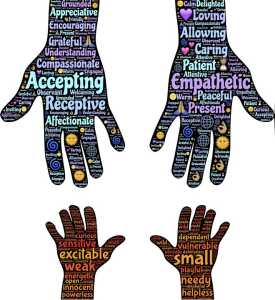I wonder every day if I’m doing this right — did I remember to switch the laundry in time for Spirit Day? Did I make everyone’s lunch? Did I answer that awkward question right? Was I too hard on her? Was I too lenient? Did I lose my temper today? Where was my patience…?
Whew. It never ends. The constant loop of am I messing them up runs ragged in my brain, never giving me a moment of peace. While therapy has done *wonders* for my mental health, I don’t think the fear of failing to do something/doing something detrimental to my children will ever go away. I don’t think I’m alone in this feeling, either.
Typically, we novice parents turn to our own parents for input and advice when we feel unsure. While their experience is invaluable at times, at others, it can feel like we’re speaking a different language — especially when parenting styles differ. Friends’ advice can be useful as well, but they’re raising their children alongside ours; their knowledge has its limits.
So what if instead of asking third parties we started asking the person(s) directly involved?
Assuming your child is old enough to hold a conversation — have you ever asked them how you’re doing at this parenting gig? Has it ever crossed your mind to do so?

Now, I am by no means suggesting you go to your child for support. That is entirely too big of a job for such a small person; a fellow adult can help you with that. But what I am suggesting is more like giving a survey at the end of a customer service call — ask your child how you did.
One day, in the middle of a family crisis that lasted nearly a week, I asked my oldest daughter (six years old) for feedback. I didn’t give it much thought beforehand, it just kind of came out of my mouth in a moment of uncertainty. The week’s events were extremely strenuous for everyone in our family, especially her — her appendix had ruptured and she required emergency surgery.
Several days post-op, we were sitting in her hospital bed playing cards. I didn’t know how to make her happy or how to even get through the next hour, let alone the next two remaining days in the hospital. We were both emotional, exhausted, and homesick, and earlier in the day, we had an argument in which we had both lost control over our emotions. We snapped at each other, cried together, and were irritated all around.
After a snack and a walk around the hospital grounds, we needed to connect again.
“Evie, are you happy?”
She smiled. “Yes, Mommy. Not about my surgery, but I’m happy!”
I smiled back and asked, “Do you feel safe with me? With Daddy?”
Again she smiled, nodding her head in an enthusiastic “yes.”
“Oh, that’s so good! Hey, I wanted to ask you, is there anything you wish I would or wouldn’t do as your Mommy? Is there anything that’s bothering you that you would like me to know about?”
She flipped some of the cards on the bed face-up while she thought. “I wish you wouldn’t yell at me when I mess up or do something I’m not supposed to do. ”
I was not expecting such a useful, on-point answer if I’m being honest, so I was pleasantly surprised. “Hm. I don’t think I’ve been yelling very often; I’ve been working really hard not to. You still think I’m yelling a lot?”
She nodded.
“Do you mean when I correct you? What does the word ‘yell’ mean to you? Is it when I raise my voice really loud, or is it when I use a stern voice to correct your behavior?”
She attempted to shuffle the cards. “When you use that voice to tell me to stop doing something or to listen.”
“Ah. Okay, I see. I think what’s going on is you and I have two different definitions of the word ‘yell.’ When I hear that word, I think of raising my voice, but when you hear that word, you think of me correcting your behavior.”
Evie shrugged her shoulders. “I guess so.”
“So when I’m correcting your behavior, but I’m not raising my voice while I do it, that isn’t ‘yelling.’ That’s more like … ‘fussing.’ Does that make sense?”
As she dealt cards between us for a round of Go Fish, she considered my words. “Yes, that makes sense. But sometimes you do still actually yell, and that upsets me.”
“I can understand that. I don’t like being yelled at either. I can’t promise that I won’t ever yell, because sometimes there are emergencies and I need to yell to quickly get your attention so you and those around you stay safe. And sometimes, when people are excited, frustrated, or angry … they yell. Their voice gets louder because their feelings are bigger. Don’t you yell when you’re frustrated? Angry? Excited?”

“Yes, especially when I’m excited! And when my sisters don’t listen to me — I get so mad that sometimes I yell.”
I nodded in agreement. “Yes, you do, and that’s okay as long as it isn’t all the time, and you calm down and come back when your feelings aren’t as loud and big. Grownups still don’t know how to do that sometimes, including me. But I’m doing the best I can and I practice every day. Do you think we could both practice patience and calming down when our emotions get too big?”
She threw her arms around my neck, albeit carefully so as to not bump her wounded abdomen against me. “Yes, I can do that Mommy!”
I squeezed her as much as I could around all of the IV tubing, gauze, and tape. “Thank you for having that talk with me, Evie. I love you so much.”
“I love you, Mom.”
And just like that, I had received insight I didn’t think I’d ever get, and we clarified points of contention between us. My six-year-old and I communicated in a way I didn’t know was possible, because this type of conversation was never modeled for me. I took a chance asking my daughter for her opinion, but since that conversation, she and I have gotten along better than ever before.
I’ve also had a shorter version of this conversation with my four-year-old, and while it wasn’t as eye-opening as it was with Evie, it helps start the process for when she’s older. I want it to be natural, and normal for my daughters to come to me with anything — including constructive criticism of my parenting. After all, they are people. After all, we openly admit that as parents we don’t know what we’re doing anyway, right?
















